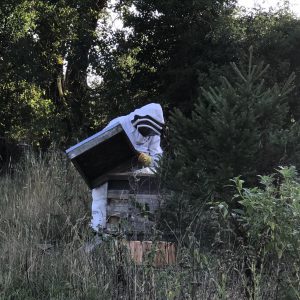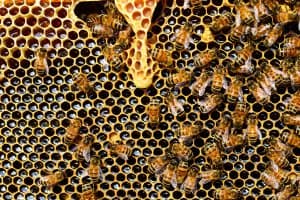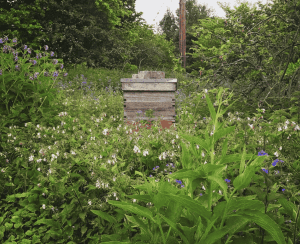This special blog features a totally different creature which comes from another kind of Incredible Egg – bees! Beekeeping has become vital in an effort to reestablish lost colonies of bees and offset the decrease in pollination by wild bees.
Our East branch manager Vicky keeps 3 hives of bees on her farm in Norfolk. She tends to each hive about every 10 days to ensure the bees and their queens are healthy and happy. Weather conditions have to be just right to do this – the calmer the better. Vicky uses smoke to calm the bees whilst they are being checked, which sedates them without causing them harm. Honey is only ever taken if the bees have created a surplus beyond what is needed to sustain the hive.
 Vicky tending to one of her hives
Vicky tending to one of her hives
There are over 250 species of bees in the UK, and the honey bee is just one of them. It’s almost impossible to overstate the importance of pollinators in our ecosystem – the survival of plants depend on it – and the honey bee accounts for 80% of all pollination done by insects. Unfortunately the numbers of many of our bee species are in decline, and some have even become extinct. There are several possible reasons for this, but it’s an astonishing fact that in England over 97% of all flower-rich grasslands have been lost since the 1930s – that’s three million hectares, or an area one and a half times the size of Wales.

How can we as individuals help bees?
- Fill your garden with flowering plants that are rich in pollen and nectar. Remember that variety is key. Include plants with a wide range of floral shapes and colours to increase the number of bee species attracted to your garden
- Increase the size of your flowerbeds
- Reduce or preferably ban the use of pesticides in your garden. The EU recently extended its ban on the agricultural use of neonicotinoid pesticides in acknowledgement of the harm they cause bees, but the same chemicals are often found in common garden pesticides
- Ditch the weedkiller and let the wild flowers grow! Many ‘weeds’ provide rich sources of pollen and nectar
- Mow the lawn less often, so that plants like clover and dandelions have the chance to flower
 A hive in Norfolk this summer
A hive in Norfolk this summer
